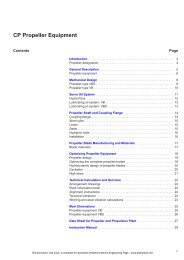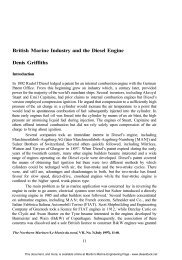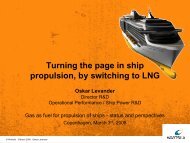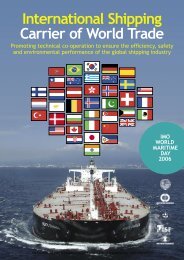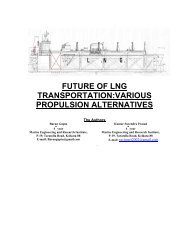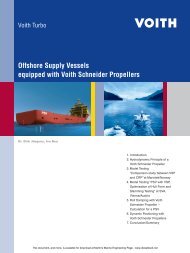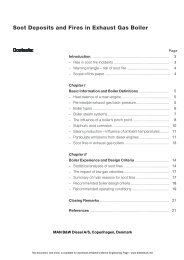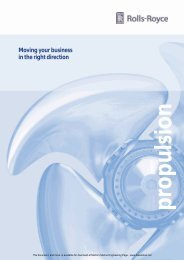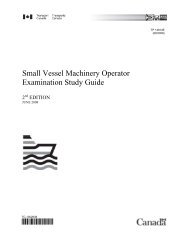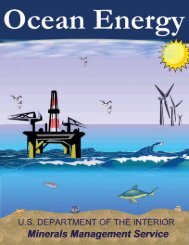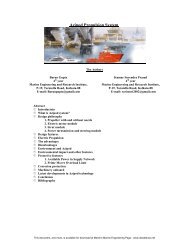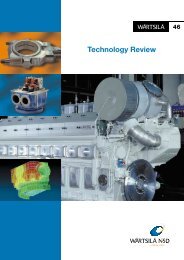Fire on Board the Liberian Passenger Ship Ecstasy, Miami, Florida ...
Fire on Board the Liberian Passenger Ship Ecstasy, Miami, Florida ...
Fire on Board the Liberian Passenger Ship Ecstasy, Miami, Florida ...
- No tags were found...
You also want an ePaper? Increase the reach of your titles
YUMPU automatically turns print PDFs into web optimized ePapers that Google loves.
Analysis 63 Marine Accident Reportinlets and outlets <strong>on</strong> <strong>the</strong> mooring decks. The Coast Guard, recognizing <strong>the</strong> safety issuesinherent in <strong>the</strong> design arrangement, has proposed that <strong>the</strong> IMO clarify <strong>the</strong> category formooring decks such as <strong>the</strong> type <strong>on</strong> <strong>the</strong> <strong>Ecstasy</strong>. The Coast Guard recommended that, forall new c<strong>on</strong>structi<strong>on</strong>, a partially covered mooring deck be categorized as an auxiliarymachinery space. This categorizati<strong>on</strong> would not <strong>on</strong>ly require fire protecti<strong>on</strong> systems(detecti<strong>on</strong> and suppressi<strong>on</strong>) but also prohibit using <strong>the</strong> space as a ventilati<strong>on</strong> terminus.The status of <strong>the</strong> Coast Guard’s proposal at IMO is pending. Regardless of whe<strong>the</strong>r<strong>the</strong> IMO does or does not agree to categorize mooring decks as recommended by <strong>the</strong>Coast Guard, any acti<strong>on</strong> taken by <strong>the</strong> IMO will not take effect immediately and may affect<strong>on</strong>ly certain cruise ships. The Safety <strong>Board</strong> is c<strong>on</strong>vinced that all efforts should be madewithout delay to minimize <strong>the</strong> potential for fire <strong>on</strong> mooring decks that are incorporatedinto <strong>the</strong> vessel structure, such as <strong>the</strong> mooring decks <strong>on</strong> <strong>the</strong> Fantasy Class cruise ships. The<strong>Board</strong> recognizes that some mooring decks are used to store <strong>on</strong>ly anchors or smallcombustibles or both and, thus, might not warrant fire protecti<strong>on</strong>. To optimize safety,cruise ship companies need to examine <strong>the</strong>ir mooring stati<strong>on</strong>s for fire risk and determine<strong>the</strong> need for detecti<strong>on</strong> and suppressi<strong>on</strong> systems. The Safety <strong>Board</strong> believes, <strong>the</strong>refore, that<strong>the</strong> cruise ship companies should, for existing vessels having mooring deck arrangementssimilar to Carnival Cruise Lines’ Fantasy Class ships, install automatic fire suppressi<strong>on</strong>systems <strong>on</strong> mooring decks that c<strong>on</strong>tain high fire loads and presently have no automaticfire protecti<strong>on</strong>.Ventilati<strong>on</strong> SystemSOLAS II-2 Regulati<strong>on</strong> 16 requires that <strong>the</strong> ventilati<strong>on</strong> systems for high-risk areassuch as category A machinery spaces and galleys have an automatic fire damper where aduct crosses an A-class boundary to mitigate <strong>the</strong> spread of smoke and fire. SOLAS doesnot include laundries in <strong>the</strong> category of high-risk areas, despite <strong>the</strong> fact that laundryventilati<strong>on</strong> systems can accumulate appreciable amounts of ignitable lint.<str<strong>on</strong>g>Fire</str<strong>on</strong>g>s in laundry facilities, including associated storerooms, can generatesignificant amounts of heat and smoke, frequently with lethal c<strong>on</strong>sequences, as <strong>the</strong> Safety<strong>Board</strong> discovered during its investigati<strong>on</strong> of fires <strong>on</strong> board <strong>the</strong> Universe Explorer and <strong>the</strong>Vistafjord. Based <strong>on</strong> its findings in <strong>the</strong>se two accidents, which killed 6 people and injured72 o<strong>the</strong>rs, <strong>the</strong> Safety <strong>Board</strong> determined that timely isolati<strong>on</strong> of a fire is crucial tomitigating <strong>the</strong> effects of heat and smoke.The ventilati<strong>on</strong> ducts in <strong>the</strong> <strong>Ecstasy</strong>’s main laundry had fail-safe fire dampers;however, if <strong>the</strong> ventilati<strong>on</strong> system did not lose power, <strong>the</strong> dampers had to be shut bysome<strong>on</strong>e present in <strong>the</strong> area or by some<strong>on</strong>e <strong>on</strong> <strong>the</strong> bridge. In this accident, if <strong>the</strong> fire in <strong>the</strong>overhead had triggered <strong>the</strong> closure of <strong>the</strong> laundry fire dampers, <strong>the</strong> shutdown would haveoccurred several minutes before <strong>the</strong> bridge pers<strong>on</strong>nel secured <strong>the</strong> ventilati<strong>on</strong> system,which would have resulted in appreciably less heat, smoke, and flame escaping from <strong>the</strong>main laundry and spreading to <strong>the</strong> mooring deck.



